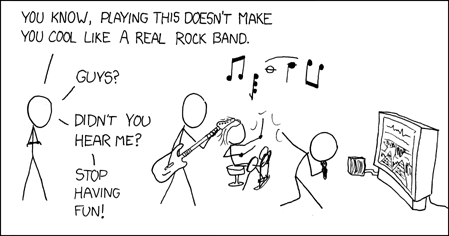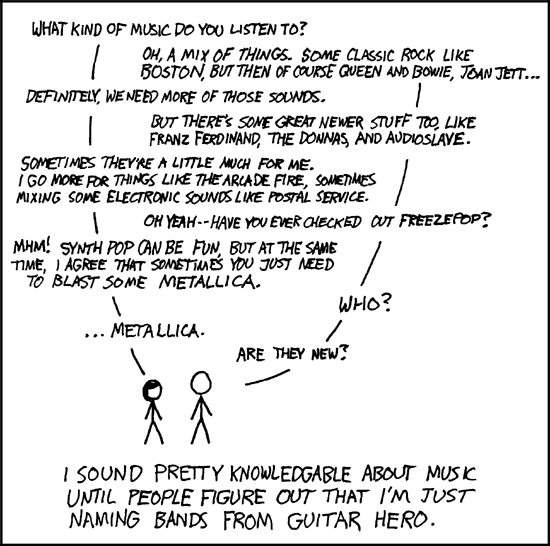
I had DJ Hero at home for a long time before I put the disc in the PS3. It's tricky when video games occupy such a peculiar category in my life: too fun to be high-priority during the work day, too much like work for the evenings. (And in some cases also too noisy/intense, both for the downstairs neighbors and for me -- after a long day, loud rock music and the incessant tapping of the RB drum kit feel like sensory overload). So the DJ Hero turntable controller was just sitting around for weeks, on the same table as my spouse's actual turntables and mixer. Yet somehow until I finally sat down to play the game it didn't occur to me how weird it is that the controller only includes a single turntable (maybe because during its sitting-around-in-the-corner period it had so much DJ-gear company, like it was the third turntable in someone's kit).
I have no DJing experience myself -- indeed, I still get nervous about actually setting a needle down on a record, on the rare occasions that I attempt such a thing. But I've spend a lot of time with DJs, and I've taught a lot of classes that revolve around post-turntablism music. When I'm teaching the first class meeting of a multi-week unit about hip-hop, I often begin by asking the class, "Why are two turntables better than one?" And when I watch a DJ at work with two turntables and a mixer, I'm often awed by his/her ambidextrous virtuosity. Of course club DJs today use all kinds of equipment, but given that DJ Hero features a turntable at all (vs. any of the myriad other interface possibilities for simulating real-time remix production), it seems peculiar to just use one. Especially when the game tutorial voiceover is by Grandmaster Flash (who starts things off by emphasizing his own turntablism pioneer status). There's something surreal about having Grandmaster Flash explain that each of the three buttons on the single turntable represents a different sound source, as though this had been his pioneering innovation. Someone unfamiliar with record players might conclude that all records come broken into three concentric rings, which you can mix and match on your single turntable and manipulate individually as you play your set. And of course this implies the presence of three invisible tonearms/needles (the controller doesn't include any representation of the tonearm/needle at all).
[Maybe now I have a better sense of the cognitive dissonance guitarists experience when they first encounter a GH/RB guitar controller, i.e., why the hell would you make a guitar with no strings? For me, a pianist with no stringed-instrument experience, the fret buttons just seemed like a very simple keyboard -- though the idea that one could fret before strumming required some mental adjustments.]
When I actually started to play a DJ Hero set, I discovered the satisfying click of the cross-fader. This click has strong associations for me; at a club the music would be way too loud for me to hear it, but it's a big part of the sound when my spouse is mixing in the living room. It helps me distinguish what he's doing with his mix vs. what was already part of the mix on each record (because the clicking cues me that he's shifting between the two sources). I also just like the sound -- the crispness of it, and the way that it makes a rhythmic pattern of its own that interlocks with the rhythm of the musical mix in interesting ways. So while the turntable part of the controller packed more associations visually, once I was playing the game it was the cross-fader that made me feel more aligned with a DJ's kinesthetic experience. The DJ Hero turntable doesn't even spin around (except when you briefly spin it backward yourself on "rewinds"); I certainly wasn't imagining a record was under my right hand. Maybe some kind of track pad, but not a record.
But was it fun to play? Yes, definitely, and also a lot more relaxing than playing GH/RB. This is dance music, after all, and instead of "star power" you earn and deploy "euphoria" (leading to bizarre screen texts like "euphoria used", but that's a subject for another post). As one might expect, this game's remixes/mashups are structured very differently from the rock songs in GH/RB, and the result is a trippier kind of immersion/flow. The musical selections are also much more in line with my own listening tastes, so waiting while someone else played a song was more fun than with GH/RB (plus it didn't have to be turned up so loud, since there's no need to drown out drum kit noise). But something about the game makes me think it's unlikely to be a huge hit (and not just because of the recession). I feel like it's too musically complicated to offer the visceral appeal of GH/RB, where each player is always following his/her specific part and feels deeply connected to it. Also, Guitar Hero greatly increased my appreciation for some kinds of rock and metal, but I'm not sure DJ Hero is going to increase a metalhead's appreciation for electronic dance music. And I can't imagine millions of teenage boys devoting a lot of time to mastering these mashups. While I'm usually the first person to point out that the videogame-playing demographic has long since expanded beyond teenage boys, I'm still not sure what core constituency might exist for DJ Hero.
Now I want to read some reviews and see if others have reached similar conclusions -- I haven't been keeping up with media reception of DJ Hero at all, but the fact that coverage hasn't been jumping out at me with no effort on my part leads me to suspect that sales have not been good.




